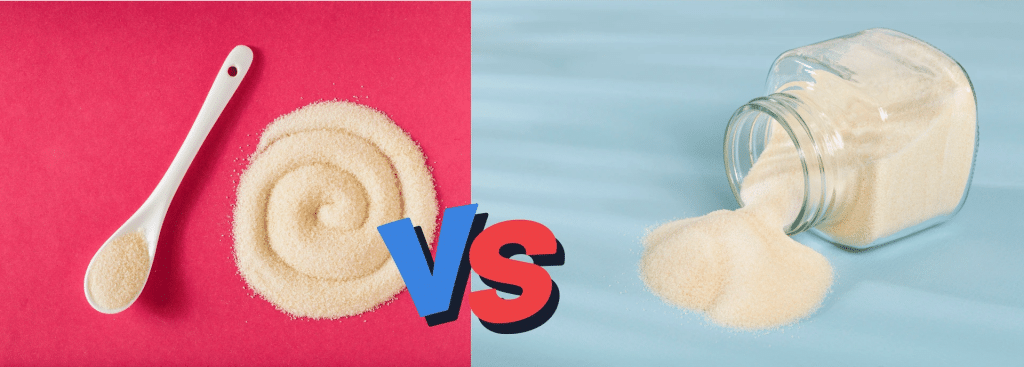In the ever-evolving landscape of health and wellness, two nutritional powerhouses have captured widespread attention: traditional bone broth and modern collagen supplements. Both promise to support skin health, joint function, and overall vitality, yet they represent fundamentally different approaches to collagen nutrition. This comprehensive guide will help you understand the key differences, benefits, and practical considerations to make an informed decision that aligns with your health goals and lifestyle.

If you don’t want to scroll through too much content, you can also jump directly to the Bone Broth vs Collagen table to give you a clear comparison Bone Broth vs Collagen table
Understanding Bone Broth: Ancient Wisdom in Modern Times
Bone broth represents one of humanity’s oldest culinary traditions, dating back thousands of years across virtually every culture. This nutrient-rich liquid is created through the slow-simmering process of animal bones—typically from beef, chicken, or fish—combined with vegetables, herbs, and often a splash of apple cider vinegar. The magic happens during the prolonged cooking time of 12 to 48 hours, which breaks down the collagen, cartilage, and marrow within the bones, releasing a complex array of nutrients into the liquid.
The traditional preparation method involves roasting bones first to enhance flavor, then covering them with filtered water and adding aromatic vegetables like onions, carrots, and celery. The addition of apple cider vinegar serves a crucial purpose beyond flavor—its acidity helps extract minerals from the bones more effectively. The result is a gelatinous, nutrient-dense broth that solidifies when cooled, indicating successful collagen extraction.
Nutritional Profile of Bone Broth
Bone broth’s nutritional complexity sets it apart from simple broths or stocks. Beyond its naturally occurring collagen content, which typically ranges from 6-12 grams per 8-ounce serving, bone broth provides an impressive array of minerals including calcium, magnesium, phosphorus, and potassium. These minerals are present in forms that are readily absorbed by the human body.
The amino acid profile of bone broth is particularly noteworthy. Glycine, proline, and hydroxyproline—the building blocks of collagen—are abundant, along with glutamine, which supports gut health and immune function. The presence of naturally occurring hyaluronic acid, glucosamine, and chondroitin sulfate adds additional therapeutic value, particularly for joint health.
Different types of bones contribute varying nutritional profiles. Marrow bones provide healthy fats and fat-soluble vitamins, while knuckle bones and joints offer the highest collagen content. Fish bones contribute omega-3 fatty acids alongside Type I collagen, making fish bone broth particularly beneficial for skin health.
Exploring Collagen Supplements: Modern Precision in Nutrition
Collagen supplements represent the modern approach to collagen nutrition, offering concentrated doses of this vital protein in convenient, standardized forms. These products typically contain hydrolyzed collagen peptides—collagen that has been enzymatically broken down into smaller molecular chains for enhanced absorption and bioavailability.
The manufacturing process of collagen supplements involves extracting collagen from animal sources (bovine, marine, porcine, or chicken), then hydrolyzing it through controlled enzymatic processes. This hydrolysis breaks the large collagen molecules into smaller peptides, typically ranging from 2,000 to 5,000 daltons in molecular weight, making them more easily absorbed in the digestive tract.
Types and Sources of Collagen Supplements
Modern collagen supplements are primarily sourced from four main origins, each offering distinct benefits. Marine collagen, derived from fish skin and scales, provides predominantly Type I collagen and is often considered the most bioavailable form. Bovine collagen, sourced from cow hides and bones, offers both Type I and Type III collagen, making it versatile for skin, bone, and muscle support. Porcine collagen, from pig skin, closely resembles human collagen in its amino acid profile. Chicken collagen, derived from cartilage and bones, is rich in Type II collagen, specifically beneficial for joint health.
The concentration of collagen in supplements typically ranges from 10 to 25 grams per serving, providing a standardized dose that’s impossible to achieve consistently with food sources alone. This precision allows for targeted therapeutic approaches to specific health concerns.
Nutritional Comparison: Quality vs Quantity
When comparing bone broth and collagen supplements, the question of bioavailability becomes paramount. While bone broth contains whole collagen that breaks down into gelatin during cooking, supplements provide pre-hydrolyzed peptides that require minimal digestive processing. Research suggests that hydrolyzed collagen peptides have superior absorption rates, with studies showing peak plasma levels occurring within 1-2 hours of consumption.
However, bone broth offers nutritional complexity that supplements cannot match. The mineral content alone—including bioavailable forms of calcium, magnesium, and trace elements—provides significant added value. The presence of complementary nutrients like vitamin C from vegetables, healthy fats from marrow, and various amino acids creates a synergistic nutritional profile that supports the body’s natural collagen synthesis processes.
The collagen content varies significantly between sources. Homemade bone broth can contain anywhere from 6-20 grams of collagen per cup, depending on the bones used, cooking time, and preparation method. Store-bought versions often contain considerably less, sometimes as little as 2-3 grams per serving. In contrast, collagen supplements provide consistent, measured doses that allow for precise nutritional planning.
Health Benefits: A Comprehensive Analysis
Skin Health and Anti-Aging
Both bone broth and collagen supplements offer compelling benefits for skin health, though through different mechanisms. Clinical studies on collagen supplements have demonstrated significant improvements in skin elasticity, hydration, and wrinkle reduction. A landmark study published in the Journal of Cosmetic Dermatology found that participants consuming 2.5-5 grams of collagen peptides daily showed measurable improvements in skin elasticity after just 4 weeks.
Bone broth supports skin health through its comprehensive nutrient profile. The vitamin C from vegetables aids collagen synthesis, while the hyaluronic acid naturally present in the broth helps maintain skin moisture. The mineral content supports cellular repair processes, and the glycine content promotes healthy sleep patterns, which is crucial for skin regeneration.
Joint Health and Mobility
The benefits for joint health represent one of the most well-researched applications of both bone broth and collagen supplements. Type II collagen, abundant in chicken bone broth, has been specifically studied for its effects on cartilage health and joint comfort. The naturally occurring glucosamine and chondroitin in bone broth provide additional joint support compounds.
Collagen supplements, particularly those containing Type II collagen, have shown remarkable results in clinical trials. Studies indicate that daily consumption of 40mg of undenatured Type II collagen can significantly reduce joint discomfort and improve mobility in as little as 90 days. The standardized dosing of supplements allows for consistent therapeutic levels that may be difficult to achieve with bone broth alone.
Gut Health and Digestive Support
Both options excel in supporting digestive health, though through different pathways. The glutamine in bone broth serves as fuel for intestinal cells, supporting gut barrier function and potentially addressing leaky gut syndrome. The gelatin content helps soothe and protect the digestive tract lining, while the easily digestible proteins provide gentle nutrition for compromised digestive systems.
Collagen supplements contribute to gut health primarily through their glycine content, which supports stomach acid production and digestive enzyme function. Some studies suggest that collagen peptides may help reduce inflammation in the digestive tract and support the growth of beneficial gut bacteria.
Practical Considerations: Cost, Convenience, and Quality
Economic Factors
The cost analysis between bone broth and collagen supplements reveals interesting considerations. High-quality, grass-fed bone broth can cost $3-8 per 16-ounce container, providing approximately 12-24 grams of collagen. Premium collagen supplements typically cost $30-60 per month for daily servings of 15-20 grams.
When making bone broth at home, the economics shift dramatically. A batch made from $10-15 worth of quality bones can yield 12-16 cups of broth, making the cost per serving quite economical. However, this doesn’t account for the time investment—12-48 hours of cooking time—which many people find prohibitive.
Convenience and Lifestyle Integration
Modern lifestyles often favor the convenience of collagen supplements. They’re shelf-stable, portable, and can be easily incorporated into existing routines by mixing into coffee, smoothies, or other beverages. The tasteless nature of most hydrolyzed collagen makes it virtually undetectable in foods and drinks.
Bone broth requires more planning and preparation but offers greater culinary versatility. It can serve as a warming beverage, soup base, cooking liquid for grains, or ingredient in various recipes. Many people find the ritual of sipping warm bone broth meditative and satisfying in ways that supplements cannot match.
Quality Considerations and Safety
Sourcing and Purity
Quality varies dramatically in both categories, making informed selection crucial. For bone broth, the source of bones is paramount. Bones from grass-fed, pasture-raised, or wild-caught animals generally contain higher nutrient levels and fewer contaminants. Conventional bones may contain residues from antibiotics, hormones, and environmental toxins that can concentrate during the long cooking process.
Collagen supplements face their own quality challenges. Third-party testing for heavy metals, pesticide residues, and microbial contamination is essential but not universal among manufacturers. Look for products with NSF, USP, or similar certifications that verify purity and potency claims.
Potential Drawbacks and Considerations
Bone broth, despite its benefits, has potential downsides. The long cooking process can concentrate heavy metals, particularly lead, if bones from older animals or contaminated sources are used. Some people experience digestive upset from the high mineral content, particularly when first introducing bone broth to their diet.
The histamine content in bone broth can be problematic for individuals with histamine intolerance, as the long cooking process can increase histamine levels significantly. Additionally, the high glutamate content may affect sensitive individuals.
Collagen supplements are generally well-tolerated but can cause digestive upset in some people, particularly at higher doses. Allergic reactions, while rare, can occur, especially with marine collagen in individuals with fish allergies.
Making the Right Choice: Personalized Recommendations
Individual Health Goals
Your specific health objectives should guide your choice between bone broth and collagen supplements. If your primary goal is skin health with measurable anti-aging benefits, the research strongly supports collagen supplements for their consistent dosing and proven clinical results. For comprehensive wellness, gut health, and mineral support, bone broth offers broader nutritional benefits.
Those dealing with joint issues may benefit from a targeted approach using Type II collagen supplements, while individuals seeking general health maintenance might prefer the holistic nutrition of bone broth. Athletes and active individuals often benefit from the higher protein content and rapid absorption of collagen supplements.
Lifestyle Compatibility
Consider your daily routine, cooking habits, and personal preferences. If you enjoy cooking, have time for meal preparation, and appreciate savory flavors, incorporating bone broth into your routine can be deeply satisfying. If you travel frequently, have limited time, or prefer neutral-tasting supplements, collagen powder or capsules may be more practical.
Budget constraints also play a role. While high-quality options in both categories can be expensive, homemade bone broth can be very economical for those willing to invest the time. Collagen supplements offer predictable monthly costs and consistent dosing.
The Integration Approach: Combining Both Strategies
Many health practitioners recommend combining both bone broth and collagen supplements to maximize benefits while addressing different aspects of health. This approach allows you to enjoy the mineral content and culinary satisfaction of bone broth while ensuring adequate collagen intake through supplements.
A practical integration might involve consuming 8-12 ounces of bone broth 3-4 times per week while supplementing with 10-15 grams of collagen peptides on non-broth days. This strategy provides nutritional variety while maintaining consistent collagen intake for therapeutic benefits.
Conclusion: Your Path to Optimal Collagen Nutrition
The choice between bone broth and collagen supplements doesn’t have to be an either-or decision. Both offer unique benefits that can support different aspects of health and wellness. Collagen supplements excel in providing concentrated, bioavailable collagen for targeted therapeutic benefits, particularly for skin health and joint support. Bone broth offers a more holistic approach, providing collagen along with minerals, amino acids, and other beneficial compounds that support overall wellness.
The key to success lies in choosing the option—or combination of options—that best fits your health goals, lifestyle, and preferences. Whether you choose the time-honored tradition of bone broth, the modern convenience of collagen supplements, or a thoughtful combination of both, you’re investing in your body’s foundational protein needs.
Remember that consistency matters more than perfection. The best collagen source is the one you’ll use regularly as part of a comprehensive approach to health that includes proper nutrition, regular exercise, adequate sleep, and stress management. By understanding the unique benefits and practical considerations of each option, you can make an informed decision that supports your journey toward optimal health and vitality.
Bone Broth vs Collagen table
Bone Broth vs Collagen Supplements
Complete Side-by-Side Comparison for Informed Decision Making
| Comparison Factor | 🍲 Bone Broth | 💊 Collagen Supplements |
|---|---|---|
| Collagen Content | 6-20g per 8oz (variable amount) |
10-25g per serving (standardized) |
| Collagen Type | Type I, II, III (naturally occurring) |
Hydrolyzed peptides (pre-broken down) |
| Bioavailability | Moderate (requires digestion) |
High (pre-hydrolyzed) |
| Preparation Time | 12-48 hours cooking required |
Ready to use instant mixing |
| Cost per Serving | $1-3 (homemade) $3-8 (store-bought) |
$1-2 per serving |
| Monthly Cost | $30-90 (depending on frequency) |
$30-60 (consistent pricing) |
| Convenience | Low ⭐⭐ (time-intensive) |
Very High ⭐⭐⭐⭐⭐ (mix and go) |
| Taste | Rich, savory flavor (umami-rich) |
Tasteless/neutral (undetectable) |
| Shelf Life | 3-5 days (refrigerated) |
2+ years (dry storage) |
| Additional Nutrients |
✓ Minerals (Ca, Mg, P) ✓ Amino acids ✓ Hyaluronic acid ✓ Glucosamine & Chondroitin |
✗ Usually collagen only ⚠ Some contain Vitamin C |
| Best for Skin | ⭐⭐⭐ Good (comprehensive nutrition) |
⭐⭐⭐⭐⭐ Excellent (clinical studies) |
| Best for Joints | ⭐⭐⭐⭐ Very Good (natural compounds) |
⭐⭐⭐⭐⭐ Excellent (Type II collagen) |
| Best for Gut Health | ⭐⭐⭐⭐⭐ Excellent (glutamine, gelatin) |
⭐⭐⭐ Good (glycine content) |
| Absorption Time | 2-4 hours (full digestion needed) |
1-2 hours (rapid absorption) |
| Scientific Evidence | Moderate (traditional use + some studies) |
Strong (multiple clinical trials) |
| Lifestyle Compatibility | ⭐⭐ Requires planning & time |
⭐⭐⭐⭐⭐ Fits any lifestyle |
Quick Decision Guide
🍲 Choose Bone Broth if you:
- Enjoy cooking and meal preparation
- Want comprehensive mineral nutrition
- Prefer whole food sources
- Have gut health concerns
- Like savory flavors
- Have time for preparation
- Want cost-effective option (homemade)
💊 Choose Collagen Supplements if you:
- Have a busy lifestyle
- Want consistent, measurable doses
- Need quick absorption
- Focus on specific skin/joint goals
- Travel frequently
- Prefer neutral taste
- Want science-backed results
🤝 Choose Both if you:
- Want maximum benefits
- Can manage the cost
- Enjoy variety in nutrition
- Have multiple health goals
- Want insurance against inconsistency
🏆 Winner by Category
What is better, collagen or bone broth?
Neither is universally “better”—it depends on your goals. Collagen supplements provide higher, standardized doses for targeted benefits, while bone broth offers broader nutrition with naturally occurring collagen plus minerals and amino acids.
What is the downside of bone broth?
Potential downsides include high sodium content in store-bought versions, possible heavy metal concentration from poor-quality bones, time-intensive preparation, inconsistent collagen content, and potential histamine or glutamate sensitivity reactions.
How much bone broth should you drink a day for collagen?
For therapeutic collagen benefits, consume 8-16 ounces daily of high-quality bone broth, which provides approximately 6-20 grams of collagen depending on preparation method and bone types used.
How much collagen is in 8 ounces of bone broth?
An 8-ounce serving typically contains 6-12 grams of collagen, though this varies significantly based on bone types, cooking time, and preparation method. Homemade versions generally contain more than store-bought.
What type of bone broth is healthiest?
Bone broth made from organic, grass-fed, or pasture-raised animal bones is healthiest, providing higher nutrient levels and fewer contaminants. Beef bone broth generally has the highest collagen content.
Can I take bone broth and collagen together?
Yes, combining both is safe and potentially beneficial. This approach provides the comprehensive nutrition of bone broth plus the standardized collagen dosing of supplements for maximum benefits.
What type of collagen in bone broth?
Bone broth contains multiple collagen types: primarily Type I and III from beef bones, Type II from chicken bones, and various types from fish bones, naturally converted to gelatin during cooking.
Which bone broth is best for collagen?
Beef bone broth made with marrow bones, knuckle bones, and joints typically provides the highest collagen content, followed by chicken bone broth, particularly when made with feet and carcasses.
Does bone broth have collagen peptides?
No, bone broth contains whole collagen converted to gelatin, not the pre-hydrolyzed peptides found in supplements. The body must break down this gelatin during digestion, which may affect absorption efficiency.
Bone broth vs collagen for joints?
Both benefit joints differently: collagen supplements provide concentrated Type II collagen with proven clinical results for joint comfort, while bone broth offers naturally occurring glucosamine, chondroitin, and anti-inflammatory compounds.
Bone broth vs collagen for skin?
Collagen supplements show stronger clinical evidence for skin benefits due to standardized dosing and superior bioavailability, while bone broth supports skin health through comprehensive nutrition including hyaluronic acid and minerals.



